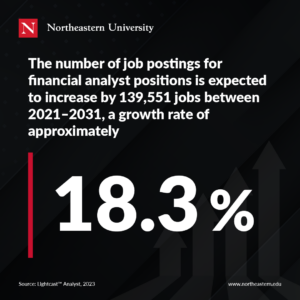If you are considering entering the finance industry or are just embarking on a career as a financial analyst, you will likely have a lot of questions about how to get started. You might ask:
- What should I study to prepare myself for this job?
- Do I need any specific licenses or certifications?
- How can I advance my career in finance?
Most important, however, you likely want to know what steps you can take today that will help you land a role in this lucrative field. Below, we explore what financial analysts do, as well as offer some guidance for aspiring financial analysts hoping to define their careers and set themselves up to be leaders in the modern financial world.
What Does a Financial Analyst Do?
Financial analysts perform many important duties in a variety of organizations across industries. Some of their most common tasks include recommending investments and portfolios to investors, evaluating financial data, studying economic trends, examining financial performance, and preparing written reports.
These responsibilities are crucial to the success of an organization, especially in today’s competitive business landscape, making financial analysts valued members within most business teams.
The duties of financial analysts have the ability to shape the direction of an organization’s strategic plans, making the role of the financial analyst one of the most important behind-the-scenes positions in any company. Daily tasks for a financial analyst can have a profound impact on risk management, financial forecasts, and company-wide investment decisions.
Financial Analyst Salary and Job Outlook
According to our analysis of job postings data, financial analysts make a median annual salary of $81,300, with 17 percent earning more than $120,000 per year. The impressive compensation that financial analysts enjoy has ranked the title as one of the highest-paying entry-level finance jobs.

In addition to competitive pay, aspiring financial analysts can also expect a positive job outlook. Our analysis of occupation data shows that there will be roughly 139,551 new financial analyst positions added to the job market by 2031, a growth rate of 18.3 percent. This imminent growth means there will soon be a high demand for qualified job applicants.

How to Become a Financial Analyst
Becoming a financial analyst requires a tailored education, mastery of related skills, and hands-on experience that will allow you to adequately meet and exceed customer expectations while adapting to the ever-changing digital landscape. Below are five key steps toward starting your financial analyst career.
1. Develop the required skills.
From analyzing a company’s financial statements to recommending individual investments, financial analysts perform many vital duties within their organizations that require certain key skills.
Some of the most important skills for financial analysts include:
- Interpersonal skills: Analysts must be able to effectively communicate their message to clients, management, and potential investors. Specifically, mastery of corporate communications is vital to the success of financial analysts when connecting with both internal and external audiences.
- Analytical skills: Financial analysts spend their days analyzing vast amounts of business data in order to help their organizations make better choices, resulting in the need for competency in data and analytics.
- Organization skills: In order to effectively recommend investments, prepare reports, and showcase information to clients, financial analysts must be organized. Working in tandem with their communication skills, a financial analyst can best convey their message when it is clear and structured.
- Mathematical skills: In order to properly analyze financial records, financial analysts must have superior math skills and maintain in-depth knowledge of statistics. These are critical elements in financial analysis, as individuals in these roles regularly analyze numbers and data while working closely with banks, pension funds, and securities firms.
- Accounting skills: In many ways, accounting is the language of business. Therefore, understanding financial accounting statements is essential for any financial analyst. Some of these documents include balance sheets, cash flows, and income statements. Analysts should also have some level of understanding in GAAP accounting processes and regulations.
- Technical skills: In order to perform their jobs effectively, financial analysts will likely need to take advantage of numerous digital tools. Programs like Tableau, for example, can be incredibly useful in helping analysts create charts and graphs that can visually represent their data when communicating with project stakeholders. Similarly, working knowledge of enterprise resource planning systems (ERPs) is also often required, as these systems help accountants link relevant data with other departments, such as inventory, human resources, etc.

2. Earn a bachelor’s degree in finance.
There are a number of ways to develop the skills needed to succeed in the role of a financial analyst. Earning a bachelor’s degree in a related field, such as a Bachelor of Science in Finance and Accounting Management, is a popular educational path forward and is typically required for entry-level financial analysts.
Nine out of ten new jobs created in 2018 went to candidates with college degrees, so obtaining a bachelor’s degree will significantly increase your chance of landing an analyst role in any industry. Those who have earned an undergraduate degree typically see higher salaries, as well. In 2020, bachelor’s degree holders earned $19,000 more annually than those with an associate degree and approximately $27,000 more annually compared to those with only a high school diploma or GED, on average.
While earning a bachelor’s degree can benefit your career in any role, those hoping to become a financial analyst will find that a bachelor’s degree is a requirement for most open positions. Our analysis of job postings data shows that—of the postings with degree requirements—81.19 percent require at least bachelor’s-level education. The majority of employers prefer degrees in a finance-related field, such as finance and accounting, economics, statistics, analytics, business management, or mathematics.
3. Obtain relevant licenses and certifications.
You may also be required to complete additional certifications or licenses beyond your bachelor’s degree for employment at certain organizations or for specific financial roles. For example, a license from the Financial Industry Regulatory Authority (FINRA) is typically required to sell financial products.
Similarly, a business or organization may prefer to hire only those who are certified financial planners (CFPs) or certified public accountants (CPAs). While these are two of the most common types of certifications held by financial analysts, there are many other potentially valuable certifications to choose from.
According to our analysis of job postings data, the top qualifications listed in financial analyst postings include:

Acquiring such certifications can be a great complement to a bachelor’s degree, enabling you to demonstrate expertise in the key functions that are central to the financial analyst role. The licenses and certifications you choose to obtain should ideally align with your personal and professional goals.
4. Gain experience in the field.
As with any competitive job market, having the proper level of experience is a critical component of standing out from the competition. Many companies have in-house training programs for entry-level financial analysts, and seizing the opportunities afforded by these programs can have a profound impact on your ability to grow and succeed in the industry. Mentorship programs and networking opportunities can also be incredibly helpful.
Additionally, you can gain a significant amount of experience during your studies by obtaining an education that values hands-on learning through real-world experiences. Experiential learning programs like those offered at Northeastern, for example, can allow for professional networking opportunities and collaboration with industry leaders on a consistent basis. This connected network can help keep you up-to-date on the latest trends, challenges, and possible solutions in today’s ever-changing, modern financial world.
5. Consider furthering your education.
While a bachelor’s degree is often the minimum requirement for many financial analyst roles, furthering your education by earning a graduate degree can make an additional positive impact on your career. Consider a master’s in finance or accounting specifically to help advance your relevant skills and show potential employers your dedication to this sector.
Did You Know? Bloomberg reports that about 16 percent of managing directors at banks hold Master in Business Administration (MBA) degrees in addition to their chartered financial analyst designation.
Breaking Into The World Of Finance
Starting a career path as a financial analyst requires hard work, dedication, and a tailored set of skills and experiences that will allow you to thrive in this vital industry role. Consider earning a related bachelor’s degree in finance and accounting from a university like Northeastern, and get started on your path toward a successful career as a financial analyst today.
Explore Northeastern’s finance and accounting management program or connect with an enrollment advisor to learn more about our online, part-time, and full-time programs.
Editor’s note: This article was originally published in November 2019. It has since been updated for accuracy.
